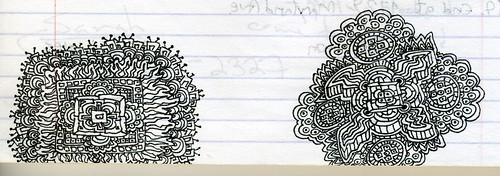I love thinking about octaves. The fact that humans are able to recognize octaves, I think that it hints at the notion that humans are in fact supposed to somehow understand the order of the universe. If you think about octaves hard enough, they will blow your freakin' mind!!
Who'd have thought that there might be important clues pertaining to the mysteries of human cognition in music? Yeah, music, the same stuff that people get down to at bars. "Achey Breaky Heart" is an example of music. Who'd have thought that in the most basic unit of music there are cosmic truths? Actually, a bunch of people did. But yeah.
So octaves... A note of exactly double the frequency as the note before it will sound like an octave, or that the human ear perceives both notes as being essentially "the same." That's the best, most eloquent definition of the octave, as being "the same, but higher." It sounds obvious, but if you think about it, what's going on there is pretty amazing. So, what that means, basically, is that inside our ear, we have a measuring device that can tell us whether or not a wave flapping, say, 400 times a second, is also flapping 800 times a second, and when it does, we perceive the two frequencies as being very similar. Not the same notes, but being the same in essence. We are somehow naturally tuned-in to the doubles and the halves of these frequencies that come into our ears, with a great deal of accuracy.
You hit middle C on a piano, then play the C one octave above it. The (most simple) frequency of the first note will be half of the second. But why do these sound the same in essence? It turns out that the mathematics involved in these frequency relationships informs much of how we perceive all of the other notes in between these octaves as well, but what is the benefit of the human ability do divide sound up and categorize it in this way? We don't see color that way, and it also has wavelengths. Hmmmm...
This might be late-night rambling, but I really think that what octaves tell us is that everything is connected, recursive, relative, and eternal. Does this mean, for example, that when we reach the edge of the universe, we actually have ended up on the opposite side (like when you went over to that opening on the right in Pac-Man, how you showed up on the left, headed the same direction)? No, I don't think that it is the same place, but it is perhaps very similar in essence (and why are you trying to get to the edge of the universe, anyway?). Like sound frequencies, there are no bounds to how high or how low something can be, but that what concerns us is the way in which those frequencies are used in context to each other. Do you feel what I am saying here?
[If I were explaining this on my imaginary talk show, I would be laying on a floating beanbag made of clouds, with my hands hanging out over the edges. Brian Eno's "Music for Airports" would play softly in the background, and diagrams would pop up on a screen made of Fruit Roll-Ups.]
Seriously though. Octaves. Just sit down on your favorite instrument and play a few. Think about what they mean. Think about what they tell you. Close your eyes and truly feel it. I really think that it's evidence that humans have the capacity to perceive things with an elegant sense of relativity. We are able to perceive things in their essence, and not just their various quantities. How cool is that?
This means that we don't so much worry about whether a sound is happening at 440 Hz or 880 Hz, because who cares, they're both A's. It's time to rock! Is this why music is so powerful?!
P.S. It turns out that monkeys also experience octave equivalency (although I'd like to find out just how they have proved this), so until I have proof otherwise, that means that everything I have said about humans here applies to them as well. I hope you are OK with that.
Saturday, February 02, 2008
The Mysterious Octave
Posted by
M. H. D.
at
2:49 AM
![]()
Subscribe to:
Post Comments (Atom)




3 comments:
See, this is why I got suddenly addicted to your blog -- there's the bathroom story, and then this fascinating rumination on octaves. I love it. I never realized that octaves were all that special before, and me being a singer! And yes, how DO they know that monkeys recognize octaves? Let me know if you find out the answer.
Dude, let me know if you ever want to go hang at the Indianapolis International Airport and sit and watch people while listening to Music For Airports because I would totally be down.
does this explain why emo music was so "powerful", due to the octave chord being its bread and butter?
Post a Comment